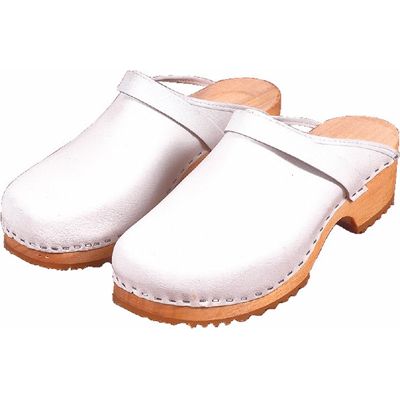From Longman Dictionary of Contemporary Englishclogclog1 /klɒɡ $ klɑːɡ/ (also clog up) verb (clogged, clogging) [intransitive, transitive] PREVENTto block something or become blocked tourists whose cars clog the roads each summerclog with Over many years, the pipes had got clogged up with grease. —clogged adjective clogged highways→ See Verb table DCCa shoe made of wood with a leather top that covers the front of your foot but not your heel → clever clogs at clever(6), → pop your clogs at pop1(13)
DCCa shoe made of wood with a leather top that covers the front of your foot but not your heel → clever clogs at clever(6), → pop your clogs at pop1(13)
Examples from the Corpus
clog• Magee could feel it clogging his nostrils.• The roads were more clogged than earlier in the day.• An increased number of arrests has clogged the court system.• Don't pour that grease down the drain, or the sink will clog up again.• We tend to pursue goals that weaken our will and clog up our view.• From both sides of Market, traffic will be so clogged up people will be put off...• A utilitarian concrete block clogged with book kiosks and leftist murals, it draws its 17,000 students from six northern provinces.• Electricity poles come down, telephone lines sag, and the streets become clogged with mud.clogclog2 noun [countable usually plural]  DCCa shoe made of wood with a leather top that covers the front of your foot but not your heel → clever clogs at clever(6), → pop your clogs at pop1(13)
DCCa shoe made of wood with a leather top that covers the front of your foot but not your heel → clever clogs at clever(6), → pop your clogs at pop1(13)Examples from the Corpus
clog• They carried parasols and held them against the driving snow as they minced along in three-inch clogs.• Gene tells me that the citizens hold a tulip festival every year and that they also manufacture clogs.• I washed and combed and plaited my hair and rubbed my clogs, then I went round and knocked on the door.• On my feet are wooden clogs.• They were crisscrossed by canvas straps, were shod with hinged wooden clogs.• They march in ranks of five, in their wooden clogs.Origin clog1 (1500-1600) clog “to prevent an animal from moving by tying a wooden block to it” ((14-19 centuries)), from clog (noun); → CLOG2 clog2 (1400-1500) clog “wooden block” ((14-19 centuries)) 
